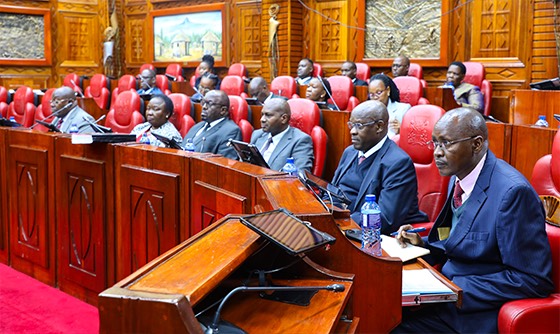Police officers injured in line of duty paid Sh709 million, NPSC says

This amount was distributed across 937 successful claims out of the 1,756 cases submitted by officers within the service.
The National Police Service Commission (NPSC) has revealed that a total of Sh709 million was paid to police officers in compensation for injuries sustained in the line of duty during the 2021-2022 period.
This amount was distributed across 937 successful claims out of the 1,756 cases submitted by officers within the service.
More To Read
- Wajir police nab suspect with AK-47 rifle in ongoing crackdown on illegal firearms
- SHA transition sparks tension as teachers cite lack of consultation, legal violations
- Review meeting highlights barriers to immunisation, maternal health in Turkana
- Court of Appeal postpones hearing on constitutionality of Health Acts
- Police assure Kenyans of security ahead of Thursday’s by-elections
- Kanja admits police could have done better in handling Gen Z protests, advocates for training
The NPSC, in a report tabled before the Senate by CEO Peter Leley, outlined the status of various claims which are still pending.
Of these, 161 claims worth Sh108 million are currently under review, while 240 other claims, totalling Sh289 million, were rejected under the group personal accident cover.
Additional claims remain unresolved due to documentation issues and internal reviews.
Leley noted that 116 claims, amounting to Sh110 million, are pending due to incomplete documentation.
Furthermore, 422 claims worth Sh444 million are still under internal review by the Social Health Authority (SHA), previously the National Hospital Insurance Fund (NHIF).
There are also 65 claims totalling Sh81 million that were submitted after the 24-month deadline.
Another 63 cases, valued at Sh69 million, are awaiting the execution of discharge vouchers, while 158 disputed claims, amounting to Sh264 million, await a second review.
Leley was appearing before the Committee on National Security, Defence and Foreign Relations to respond to a petition regarding compensation for police officers.
He was accompanied by NPSC Chairperson Eliud Kinuthia and other commissioners. The petition was filed by six police officers.
Compensation to police officers is governed by the Work Injury Benefits Act (WIBA), 2007, which ensures that employees are compensated for work-related injuries and diseases.
Under WIBA, the state Department of Interior entered into an agreement with NHIF to provide group life cover, WIBA benefits, and GPA for members of the National Police Service (NPS).
The compensation takes the form of salary continuation or a lump sum, based on the officer's annual gross salary.
For permanent disability due to illness, an officer receives compensation equal to one year's basic salary multiplied by the disability percentage awarded. In cases of death, illness, or injury resulting from work-related incidents, an officer is entitled to compensation of eight years' gross salary.
Concerns over delays and NHIF's role
During the Senate session, Kinuthia defended the NPSC, pointing out that the delays in the release of compensation funds were not due to the commission's actions but rather the National Hospital Insurance Fund (NHIF), which has since transitioned to the Social Health Insurance Fund (SHIF).
He expressed frustration over NHIF's failure to process claims on time, noting that despite the NPS's timely remittance of premiums and submission of claims, NHIF had not adhered to the 90-day payment timeline stipulated by WIBA.
Kinuthia also raised concerns about NHIF's exemption from regulation by the Insurance Regulatory Authority (IRA), which was granted by former Treasury Cabinet Secretary Ukur Yatani in a gazette notice dated April 17, 2020.
He argued that this exemption has left the National Police Service vulnerable to mismanagement by NHIF.
Police Service Claims Breakdown
The Kenya Police Service accounted for the largest share of claims, with 998 cases filed. The Administration Police followed with 686 claims, while the Directorate of Criminal Investigations (DCI) had 72 claims during the same period.
The process of making a claim begins when an officer reports the injury to their immediate commander, who submits a formal notification to police headquarters.
A claims officer then fills out Form 1 at the Directorate of Occupational Safety and Health Services (DOSH).
Once the officer has recovered, or during recovery, they must submit medical reports, identification documents, bank details, and a police abstract.
In the event of death, additional documents like a death certificate, burial permit, and post-mortem report are required.
After compiling all the necessary documents, the claim is sent to the insurance service provider with a forwarding letter.
The insurer then forwards the claim to DOSH, which arranges a medical assessment to determine the degree of disability. Finally, DOSH prepares an agreement form outlining the computed compensation amount.
Top Stories Today
















































